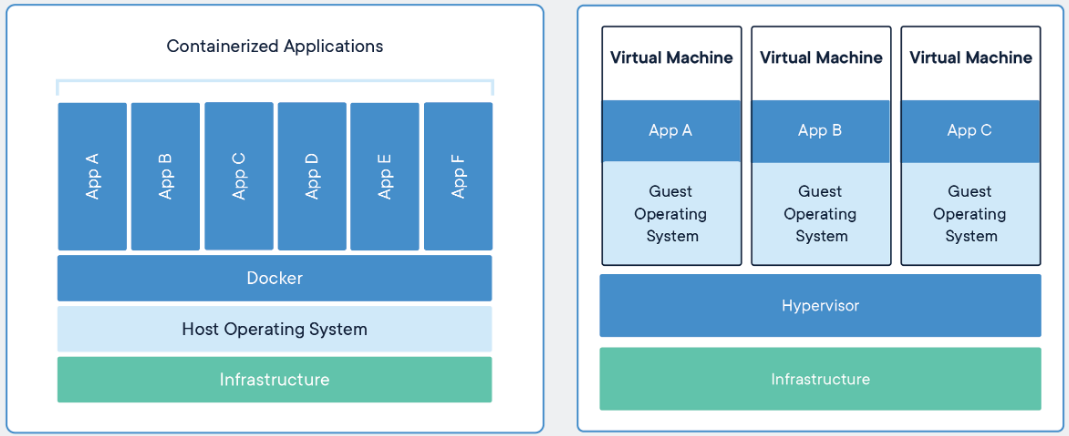Rancher 2.0 Setup (with Kubernetes engine)¶
Introduction¶
- Why Docker Container ??
- A container is a standard unit of software that packages up code and all its dependencies so the application runs quickly and reliably from one computing environment to another. A Docker container image is a lightweight, standalone, executable package of software that includes everything needed to run an application: code, runtime, system tools, system libraries and settings.
-
Why Kubernetes ?? K8s ??
- Kubernetes provides a container-centric management environment. It orchestrates computing, networking, and storage infrastructure on behalf of user workloads.
- Why Rancher ??
- Rancher combines everything an organization needs to run containers in production and centrally manage multiple Kubernetes clusters
- Rancher includes a full Kubernetes distribution, but adds value around Kubernetes in three key areas: Cluster Operations and Management, Intuitive Workload Management, and Enterprise Support.
Nomenclature (Kubernetes like)¶
Rancher 2.0 Guide to provisioning a Kubernetes cluster which uses the Kubernetes container-orchestration system to
| Name | Kubernetes concepts |
|---|---|
| Container | Pod (Simplest Kubernetes object representing a set of containers on the cluster) |
| Services | Workload (Units of work that are running on the cluster, these can be pods or deployments) |
| Load Balancer | Ingress |
| Stack | Namespace (A virtual cluster) |
| Environment | Project (Administration)/Cluster (Compute machines that run containerized applications) |
| Host | Node (Physical or virtual machines making up the cluster) |
| Catalog | Helm |
A. Cluster Description¶
- Deployment Google Slides
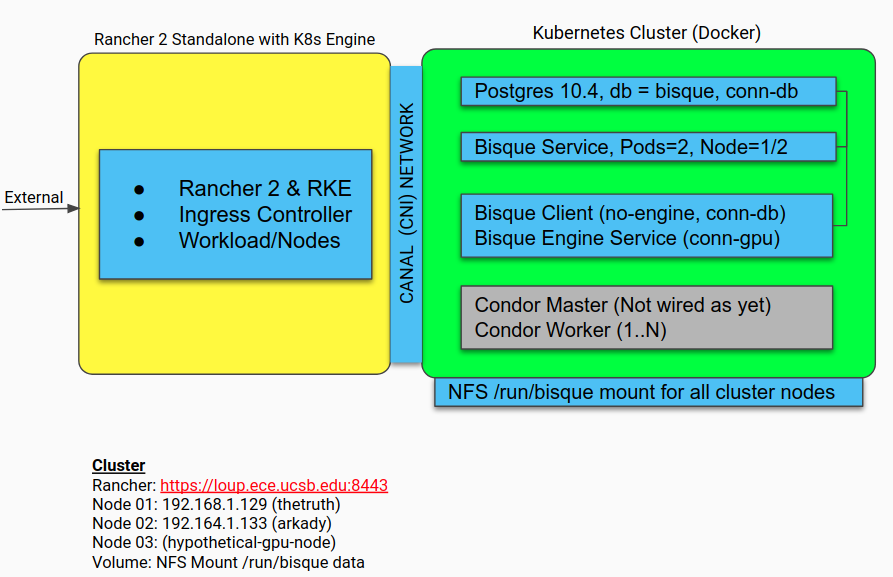
B. Lets Encrypt on Ubuntu 16.04¶
- Bind the hostname to the IP address by creating an A record in DNS
- Letsencrypt ACME challenge at TCP/80 on host
- Open up firewall for this "sudo ufw allow 80 && sudo ufw allow 80 443"
- Verify the port 80 availability
sudo netstat -peanut | grep ":80"
- Setup certificates at /etc/letsencrypt
sudo certbot certonly --standalone --dry-run \ --cert-name loup.ece.ucsb.edu -d loup.ece.ucsb.edu
C. Master Rancher 2.0¶
Install/Startup Rancher: https://rancher.com/docs/rancher/v2.x/en/installation/single-node/ - Rancher etcd data persisted at /var/lib/rancher - Since port 80 is occupied by rancher/rancher, a rancher/rancher-agent cannot be run on this node.
docker run -d --restart=unless-stopped \ -p 8080:80 -p 8443:443 \ -v /var/log/rancher/auditlog:/var/log/auditlog \ -v /host/rancher:/var/lib/rancher \ -e AUDIT_LEVEL=1 \ rancher/rancher:stable

- You will have rancher accessible at https://loup.ece.ucsb.edu:8443 if everything goes fine
- Create the YAML configuration based on docker-compose.yaml (In case of migration)
- Create an access key for Rancher CLI operations (Doesnt work on self-signed certs)
- endpoint : https://loup.ece.ucsb.edu:8443/v3
- access-key: token-xt47w
- secret-key: < >
- bearer-tok: token-xt47w: < >
Migration CLI¶
- Download the docker-compose and rancher-compose.yml files from existing rancher user interface for migration https://rancher.com/docs/rancher/v2.x/en/v1.6-migration
- Migration using CLI tools
migration-tools export --url <RANCHER_URL> --access-key <RANCHER_ACCESS_KEY> \ --secret-key <RANCHER_SECRET_KEY> --export-dir <EXPORT_DIR>
./migration-tools parse --docker-file compose/docker-compose.yml \ --rancher-file compose/rancher-compose.yml
D. Setup Cluster RKE/custom-nodes¶
Port requirements¶
Open up ports based on the CNI provider requirements - Use Canal as the provider in this case
# API/UI Clients sudo ufw allow 22,80,443/tcp # Etcd Plane Nodes sudo ufw allow 2379,2380,9099,6443/tcp && sudo ufw allow 8472/udp # Control Plane Nodes sudo ufw allow 2379,2380,10250,6443,9099,10254/tcp && sudo ufw allow 8472/udp # Worker Plane Nodes sudo ufw allow 6443,9099,10254/tcp && sudo ufw allow 8472/udp # Workload sudo ufw allow 30000:32767/tcp && sudo ufw allow 30000:32767/udp # Others sudo ufw allow 2376/tcp
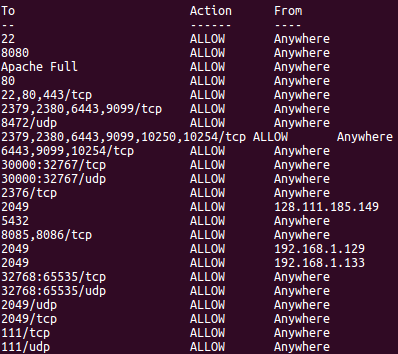
Create cluster¶
- Create a cluster in rancher-ui named "bq-cluster"
- Select "custom" local/remote nodes option to create this cluster
- Run the below command for running the rancher-agent/workers
sudo docker run -d --privileged --restart=unless-stopped --net=host \ -v /etc/kubernetes:/etc/kubernetes -v /var/run:/var/run \ rancher/rancher-agent:v2.1.6 --server https://loup.ece.ucsb.edu:8443 \ --token 7z2ncgjj4482m48fpsj7xjmc8lc9n6bsxh7qcjrsr6rcxrzhzl6prz \ --ca-checksum d522680b13d7aabe4dc57bb2776e28759852c336d0cf0e0f9fed5d3fb7b495e8 \ --etcd --controlplane --worker
-
The final "bq-cluster" state can be visualized upon creation

-
A docker ps on a node of the cluster (as created above) would look like below screenshot

-
Add more nodes as worker, by running above command on those nodes so that they register with the rancher2 and become part of this cluster. The nodes on a cluster can be visualized in rancher cluster -> nodes menu.
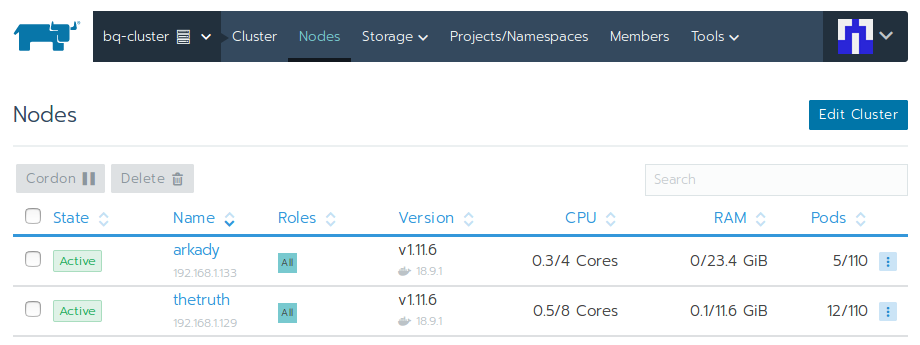
Create a namespace bqdev within this cluster¶
Bisque Development environment where workloads are deployed and tested
E. Setup Volume¶
- Mount the host directory for volume using NFS and setup the nfs client access for the cluster https://www.digitalocean.com/community/tutorials/how-to-set-up-an-nfs-mount-on-ubuntu-16-04
- Setup folders
# Create the path on host system sudo mkdir /opt/bisque/ -p && \ sudo mkdir /opt/bisque/data -p && \ sudo mkdir /opt/bisque/local/workdir -p # Allow other users to edit this sudo chown -R nobody:nogroup /opt/bisque/
- Open up the ports used by NFS
# Access from specific machines sudo ufw allow from 192.168.1.129 to any port nfs sudo ufw allow from 192.168.1.133 to any port nfs # Specific ports in case above doesnt work sudo ufw allow 32768:65535/tcp && sudo ufw allow 32768:65535/udp sudo ufw allow 2049/tcp && sudo ufw allow 2049/udp sudo ufw allow 111/tcp && sudo ufw allow 111/udp
- Now add NFS host configuration at /etc/exports
/opt/bisque 192.168.1.129(rw,sync,no_root_squash,no_subtree_check) /opt/bisque 192.168.1.133(rw,sync,no_root_squash,no_subtree_check)
- restart the nfs server on the NFS host machine
sudo systemctl restart nfs-kernel-server
- Mount the NFS folder on the client machine
sudo mount 192.168.1.123:/opt/bisque/ /run/bisque/
- Verify the mount on a client system using df -h
AND https://www.claudiokuenzler.com/blog/786/rancher-2.0-create-persistent-volume-from-nfs-share
- Create a persistent volume in the cluster
- Set local path option on the node as /run/bisque
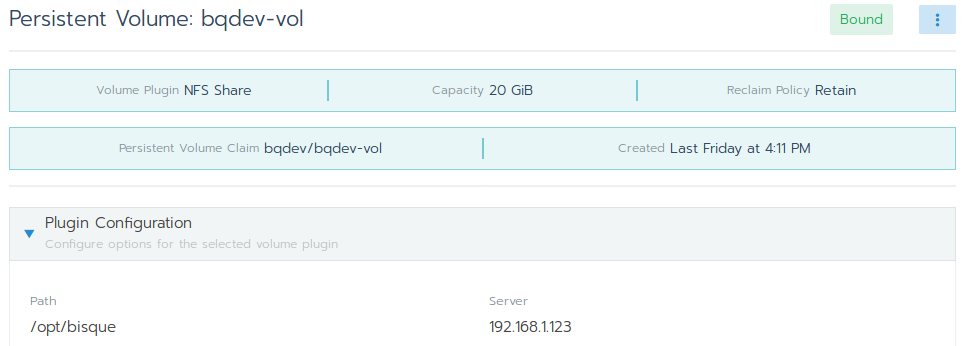
- We can see all the volumes that are created in the Volumes section of the "bq-cluster" workload
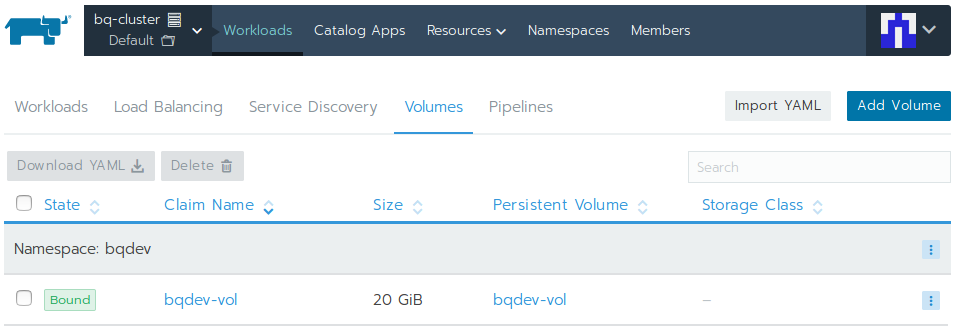
F. Setup Workload (on the cluster)¶
Bisque Test environment where workloads are deployed with open NodePort https://rancher.com/managing-kubernetes-workloads-with-rancher-2-0/
- We will be using the image at custom registry biodev.ece.ucsb.edu:5000/ucsb-bisque05-svc or we can use a publicly deployed image at https://hub.docker.com
Test workload configuration¶
- Name: ucsb-bisque05-svc
- Pods: 2
- Docker Image : biodev.ece.ucsb.edu:5000/bisque-caffe-xenial:dev or vishwakarmarhl/ucsb-bisque05-svc:dev

- Port Mapping:
- 8080-tcp-NodePort-Random & 27000-tcp-NodePort-Random
- Alternately, we can use 8080-tcp-ClusterIP(Internal)-Same & 27000-tcp-ClusterIP(Internal)-Same

- Environment Variables: Copy paste the "Environment Configuration" section
- Node Scheduling: Run all the pods on a particular host
- Health Check: No change
- Volumes: Persistent Volume claim and set the mount point as /tmp/bisque
- Scaling: No change
- Command: (Only, in case needed. Not used with the current Image)
- Entrypoint: /builder/run-bisque.sh
- Command: bootstrap start
- Working Dir: /source
- Console: Interactive & TTY (-i -t)
- Networking: No Change
- Labels: No change
- Security: No change
Finally we can see the overall state of pods in the workload within the clusters
Environment Configuration¶
- Bisque service variables
BISQUE_USER= bisque
BISQUE_BISQUE_ADMIN_EMAIL= admin@loup.ece.ucsb.edu
BISQUE_BISQUE_BLOB_SERVICE_STORES= blobs,local
BISQUE_BISQUE_STORES_BLOBS_MOUNTURL= file://$$datadir/blobdir/$$user/
BISQUE_BISQUE_STORES_BLOBS_TOP= file://$$datadir/blobdir/
BISQUE_BISQUE_STORES_LOCAL_MOUNTURL= file://$$datadir/imagedir/$$user/
BISQUE_BISQUE_STORES_LOCAL_READONLY= true
BISQUE_BISQUE_STORES_LOCAL_TOP= file://$$datadir/imagedir/
BISQUE_DOCKER_DOCKER_HUB= biodev.ece.ucsb.edu:5000
BISQUE_SECRET= bq123
BISQUE_UID= 12027
BISQUE_RUNTIME_STAGING_BASE= /run/bisque/data/staging
BQ__BISQUE__IMAGE_SERVICE__WORK_DIR= /run/bisque/local/workdir
BQ__BISQUE__PATHS__DATA= /run/bisque/data
MAIL_SERVER= dough.ece.ucsb.edu
BISQUE_DBURL=postgresql://postgres:postgres@10.42.0.15:5432/postgres
DEBIAN_FRONTEND=noninteractive
IMGCNV=imgcnv_ubuntu16_2.4.3
We should see the overview of workloads deployed as below
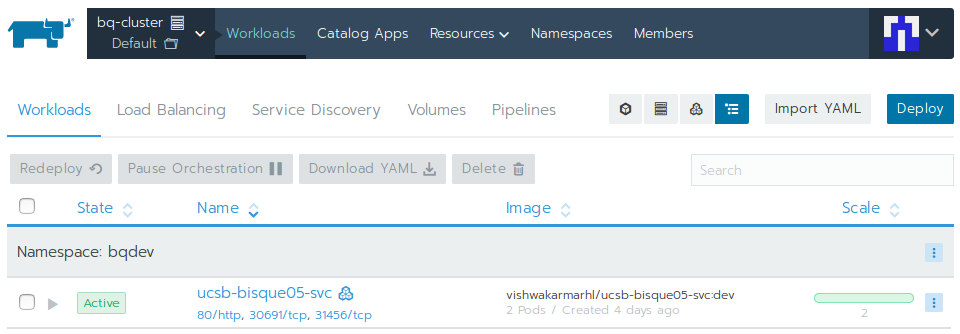
G. Load Balancing (using L7 Ingress)¶
- Add Ingress configuration for load balancing with name "bq-website"
-
Configure the target(ucsb-bisque05-svc) pods so that the port 8080 is exposed through the ingress controller
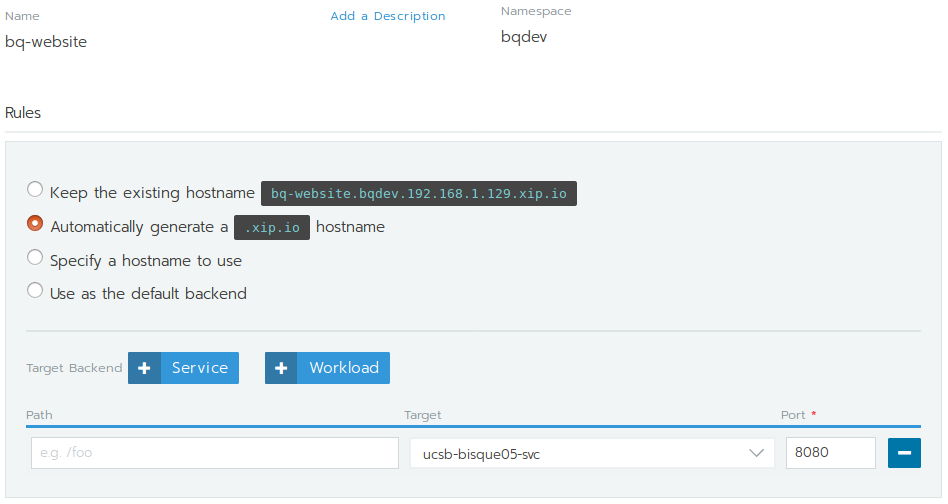
-
Load Balancing section of the workload will showcase the list of ingress controllers along with the mapping
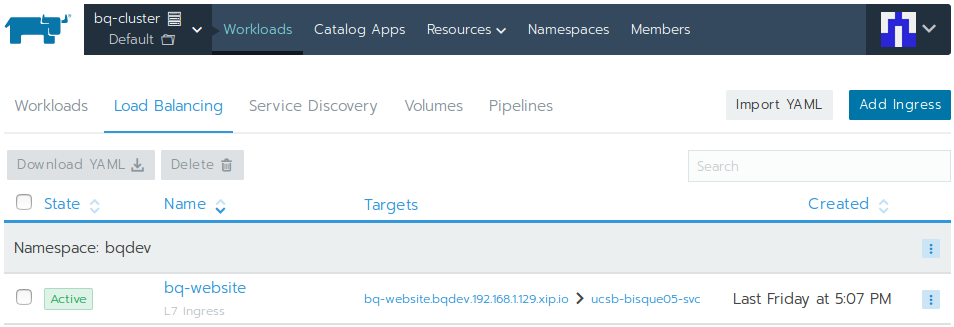
H. Monitoring/Debugging¶
- Using cluster kubectl shell from the cluster web UI
# Fetch namespaces kubectl get pods --all-namespaces kubectl get pods -n bqdev # Fetch logs on a pod/container kubectl logs postgres-564d9f79d5-z2sxl -n bqdev
-
Use Cluster dashboard for all cluster monitoring and configuration
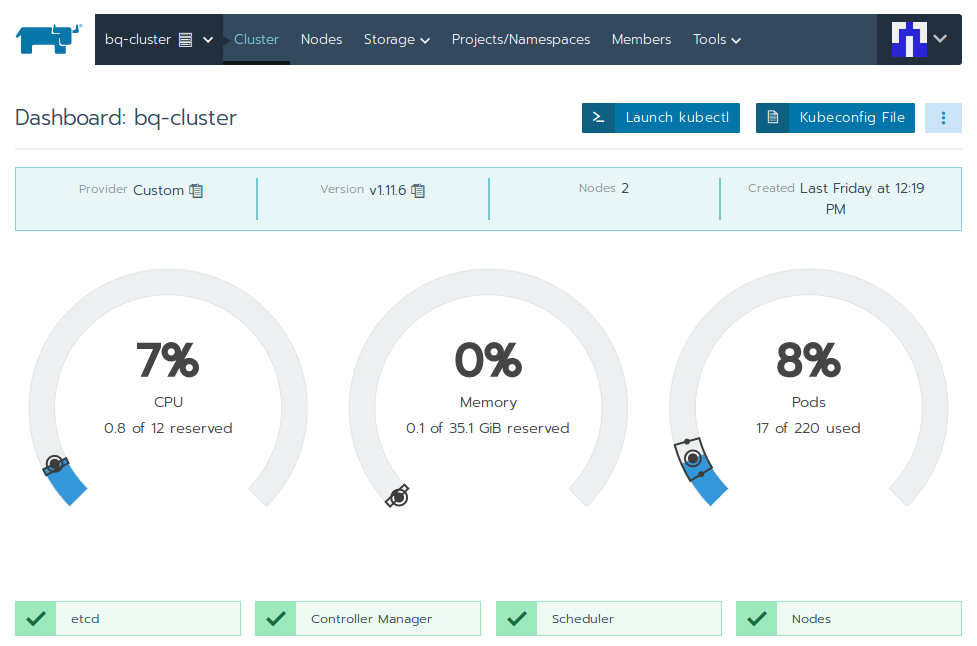
I. Uninstall Rancher¶
- Stop Rancher Containers
# Master: for the rancher server container
docker stop $(docker ps -a -q --filter ancestor=rancher/rancher:stable --format="{{.ID}}")
# Workers: for all k8s containers
docker stop $(docker ps -f name=k* --format="{{.ID}}")
- Clean the container, images and volumes
docker rm -f $(docker ps -a -f name=k* --format="{{.ID}}")
docker rmi -f $(docker images -q "rancher/*")
docker volume rm $(docker volume ls -q)
- Unmount and remove data (/var/lib/kubelet/pods/XXX, /var/lib/kubelet, /var/lib/rancher)
# Unmount directories
for mount in $(mount | grep tmpfs | grep '/var/lib/kubelet' | awk '{ print $3 }') /var/lib/kubelet /var/lib/rancher; do sudo umount $mount; done
# Clean the directories
sudo rm -rf /etc/ceph \
/etc/cni \
/etc/kubernetes \
/opt/cni \
/opt/rke \
/run/secrets/kubernetes.io \
/run/calico \
/run/flannel \
/var/lib/calico \
/var/lib/etcd \
/var/lib/cni \
/var/lib/kubelet \
/var/lib/rancher/rke/log \
/var/log/containers \
/var/log/pods \
/var/run/calico
# Mounted host directories
sudo rm -rf /host/rancher/
sudo rm -rf /var/log/rancher/auditlog
- Remove the existing network interface
ip address show ip link delete <interface_name>
Additional References¶
==TODO==
1.) Mail server setup¶
https://www.linuxbabe.com/mail-server/ubuntu-16-04-iredmail-server-installation
2.) Migration from Rancher 1.x to 2.x¶
- individual workload/containers to rancher-kubernetes using rancher-cli (doesnt work with self-signed certificates) https://rancher.com/blog/2018/2018-08-02-journey-from-cattle-to-k8s/
3.) Reference on Ingress Controllers¶
-
Load Balancers add in workloads /k8s-in-rancher/load-balancers-and-ingress
Tried using built in Ingress for
bq-website.bqdev.192.168.1.129.xip.io but failed to work for engine service -
If you want to expose the workload container to outside world then use NodePort otherwise work with ClusterIp(Internal Only) port configuration
- https://rancher.com/blog/2018/2018-08-14-expose-and-monitor-workloads/
4.) PostgreSQL server¶
- Setup PostgreSql 10.4 on Rancher workload
- This is used in the Bisque configuration as environment variable BISQUE_DBURL=postgresql://postgres:postgres@10.42.0.15:5432/postgres
